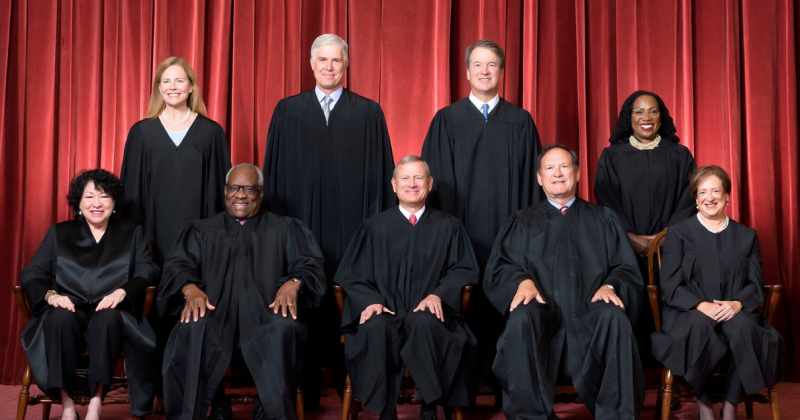Justice Ketanji Brown Jackson sparked controversy during oral arguments at the Supreme Court on Tuesday when she appeared to compare black American voters to individuals with disabilities while discussing voting rights protections.
The case, Louisiana v. Callais, centers on whether Louisiana’s congressional map violates constitutional protections.
The map includes two majority-black districts, which plaintiffs argue amounts to unconstitutional racial gerrymandering.
At issue is whether Section 2 of the Voting Rights Act conflicts with the 15th Amendment and the Equal Protection Clause of the 14th Amendment.
The plaintiffs contend that the congressional map was improperly drawn based on race.
The case has significant implications for how states draw congressional districts and the extent to which race can be considered in redistricting efforts.
Louisiana’s current map was created to comply with the Voting Rights Act.
During the hearing, Justice Jackson offered an analogy that raised eyebrows.
She compared the situation to the Americans with Disabilities Act, attempting to argue that remedial action does not require discriminatory intent.
“So going back to this discriminatory intent point, I guess I’m thinking of it, of the fact that remedial action absent discriminatory intent is really not a new idea in the civil rights laws. And my kind of paradigmatic example of this is something like the ADA [Americans with Disabilities Act],” Jackson said.
The justice continued her comparison by explaining how the ADA addresses accessibility issues.
She noted that Congress passed the law to address a world that was not accessible to people with disabilities.
Jackson argued that discrimination in effect mattered more than intent when buildings excluded disabled individuals.
She questioned why the same logic should not apply to voting access for minorities.
The justice suggested that just as buildings can be discriminatory in effect without discriminatory intent, voting systems can disadvantage minorities without states intending to do so.
This formed the basis of her controversial analogy.
She stated, “Congress passed the Americans with Disabilities Act against the backdrop of a world that was generally not accessible to people with disabilities. And so it was discriminatory in effect because these folks were not able to access these buildings. And it didn’t matter whether the person who built the building or the person who owned the building intended for them to be exclusionary; that’s irrelevant.”
“Congress said, the facilities have to be made equally open to people with disabilities if readily possible. I guess I don’t understand why that’s not what’s happening here,” she added.
The justice then made the direct comparison that drew attention.
She explicitly used the term disabled when referring to minority voters and their access to the voting system.
Jackson’s use of the word disabled appeared to be both literal and metaphorical in her argument.
She referenced past Supreme Court precedent that employed similar language to describe barriers to voting access.
“The idea in Section 2 is that we are responding to current-day manifestations of past and present decisions that disadvantage minorities and make it so that they don’t have equal access to the voting system. Right? They’re disabled. In fact ,we use the word ‘disabled’ in [Milliken v. Bradley]. We say that’s a way in which these processes are not equally open. So I don’t understand why it matters whether the state intended to do that. What Congress is saying is if it is happening … you gotta fix it,” Jackson said.
The justice’s argument centered on the idea that Congress has the power to mandate remedies for discriminatory effects regardless of whether discrimination was intentional.
She contended this principle applies to voting rights just as it does to physical accessibility, Breitbart News outlined.
Attorney Edward Greim, arguing before the Court, responded to Jackson’s analogy by highlighting a key difference.
He emphasized that remedies under the ADA do not involve stereotyping.
Greim’s response attempted to distinguish between providing physical accommodations and making race-based assumptions about voting behavior.
He argued these represent fundamentally different approaches to civil rights remedies.
“The difference is that the remedy under the ADA and other anti-discrimination laws is not stereotype,” Greim told the justice.
Jackson pushed back on this distinction, suggesting that Greim’s position would leave problems related to race without remedy.
She questioned whether he was arguing that racial issues could not have race-related solutions.
Jackson appeared concerned that rejecting race-conscious remedies would leave voting discrimination unaddressed.
“It’s not race-based. I take your point. I take your point. But you’re saying then that if the problem of no access is about race, it’s just too bad because you can’t have a remedy that relates to race,” Jackson replied.
Greim clarified his position, stating he was not arguing against race-related remedies entirely.
He drew a distinction between remedies that relate to race and those that involve racial stereotyping.
The attorney maintained that acknowledging racial disparities differs from making assumptions about how individuals will vote based on their race.
This distinction formed the crux of his constitutional argument.
“Absolutely not, your honor,” Greim responded.
He elaborated on his point about the difference between acknowledging race and making assumptions based on it.
Greim argued that the problem arises when remedies involve stereotyping voters.
The lawyer contended that while other civil rights statutes address discrimination, they do not require making assumptions about people’s political views based on protected characteristics.
He argued this makes voting rights cases constitutionally distinct.
“It’s not whether it relates to race,” Greim said.
“It’s whether the remedy that relates to race involves stereotyping voters and making assumptions about their politics and their views and their thoughts based on their race and that’s the problem. It doesn’t exist in those other civil rights statutes.”
LISTEN:

